LONDON: One of the defining images that emerged in the aftermath of the attack on Israel on Oct. 7 was a frame taken from a video, widely disseminated on social media, showing an elderly Israeli woman being driven away into captivity on a golf cart.
It was no coincidence that this image was released, nor that it was so widely used by media organizations around the world. Kidnapping is a visceral act, designed precisely to generate emotional responses that can only benefit the agenda of the hostage-takers.
Yaffa Adar, an 85-year-old Israeli grandmother, was taken from her home in Kibbutz Kfar, close to the border with Gaza.
In the photograph she sits wrapped in a blanket, surrounded by armed men yet gazing ahead with an incongruously calm expression.
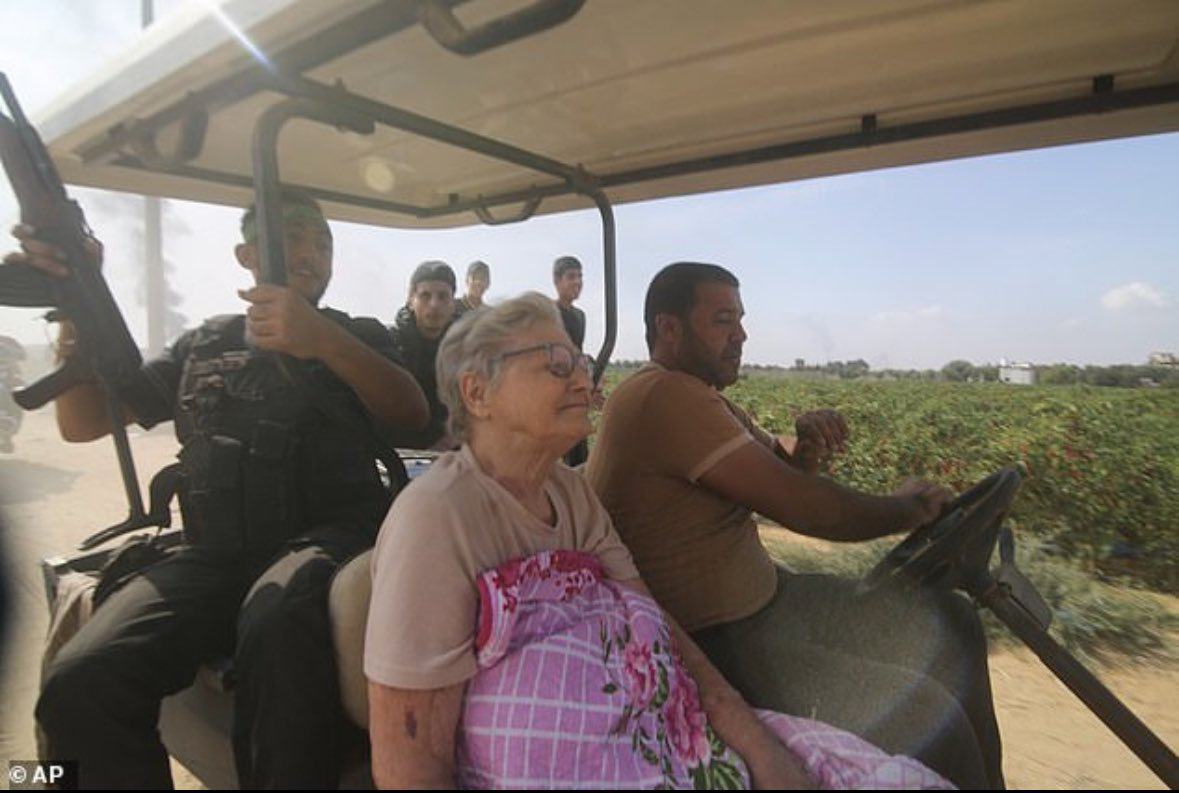
Yaffa Adar, an 85-year-old Israeli grandmother who was taken from her home in Kibbutz Kfar during the Oct. 7 Hamas attack on Israel, remains in captivity. (Hatem Ali/AP)
She is, as her granddaughter Adva Adar told Reuters on the day of the attacks, “a strong lady ... she’s sitting trying to show them she’s not afraid and she’s not hurt.”
And then she echoed the plaintive plea of every family that has ever suffered the agony of seeing a loved one snatched from their everyday world and held hostage as a pawn in a political game that is beyond their control.
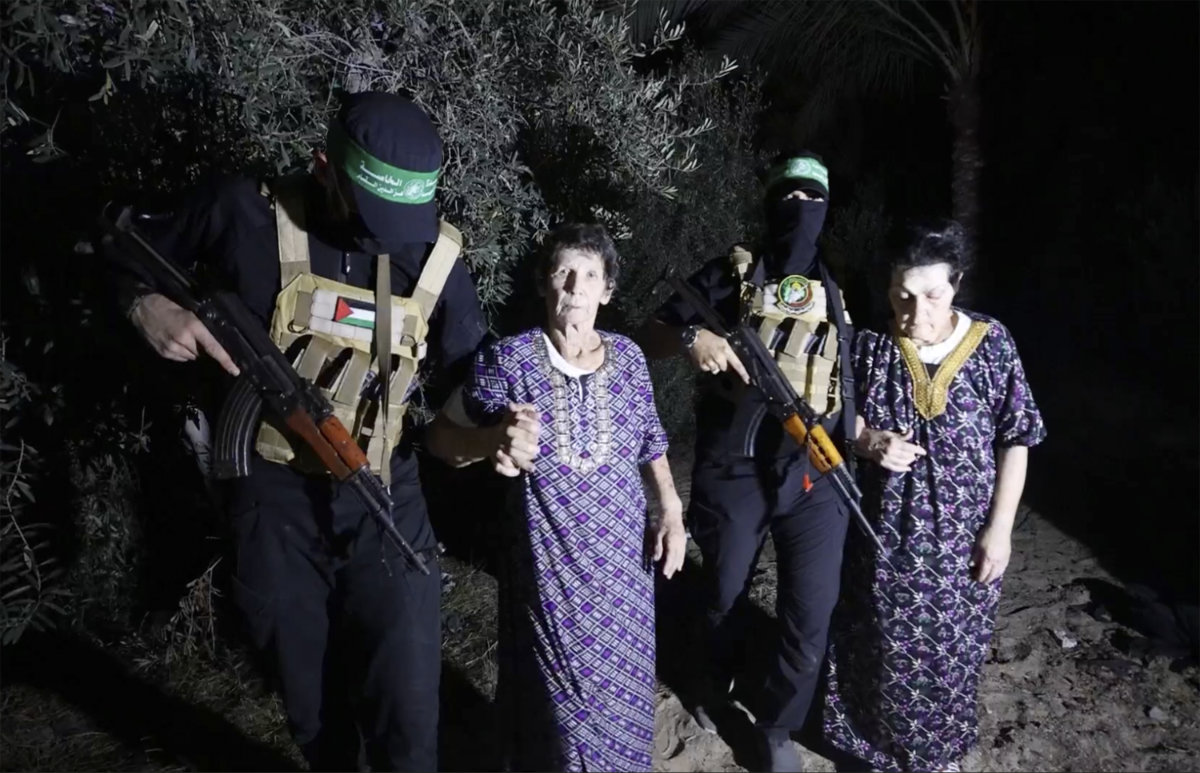
This image taken from video released by Al Qassam brigades on its Telegram channel, shows Yocheved Lifshitz, 85, center, and Nurit Cooper, 79, being escorted by Hamas as they are released to the Red Cross in an unknown location on Oct. 23, 2023. (Al Qassam Brigades via AP)
“I have a message, I have a hope that they will understand that these people have done nothing wrong,” said Adar, fighting back tears.
“I can’t even start to understand how people think it makes sense to kidnap an 85-year-old lady, to kidnap babies, kidnap kids.”
But of course, as those who are holding Yaffa Adar and an estimated 230 other hostages know all too well, in the cold-blooded logic of those who seek to leverage political advantage by placing governments under extreme emotional pressure, kidnapping vulnerable children and old ladies makes the most perfect, terrible sense.

The politics and tactics of hostage-taking is the subject of the latest report published by the Arab News Research and Studies Unit. The author is James Denselow, a writer on Middle East politics and security issues who has worked for the UK-based foreign policy think-tank Chatham House and international NGOs.
In “The Hostage Dilemma,” Denselow reviews the long and much-practised business of “hostage diplomacy,” which, he writes, has been a weapon in the arsenal of terror groups and rogue governments for decades.
From the recent and controversial release in September of five prisoners each by Iran and the US, following agreement by the American government to unfreeze $6 billion of Iranian assets, to the holding hostage for 444 days of 52 Americans seized at the US Embassy in Tehran in 1979, “perhaps the most challenging response to hostage diplomacy,” writes Denselow, “is the inconsistent policies of states toward it.”

Pro-Iran Revolution activists held 53 American citizens hostage for 444 days until Jan. 20, 1981. (Getty Images/File)
The truth of this observation can be seen now in the unfolding Gaza crisis, where the raw emotions unleashed by the plight of so many hostages is preventing a unified international response, and even muddying the waters for Israeli military planners.
The awful reality is that, even as it releases a token few hostages here and there, Hamas is seen by its critics as indifferent to the fate of the people it has taken, beyond keeping at least some of them alive long enough for the prospect of their release — or their deaths — to serve its purpose.
Desperately concerned for their loved ones, and tortured daily by thoughts of what they must be going through, many of the families of the hostages have, in effect, become the unwilling allies of their captors.
Ever since the hostages were taken, pressure on the Israeli government at home and from around the world to enter into negotiations with their captors has mounted daily.
The horror the families are dealing with was emphasised on Monday with the news that Shani Louk, a 22-year-old German-Israeli woman who was living in Tel Aviv and was thought to have been kidnapped from the scene of the massacre at the music festival at the start of the attacks on Oct. 7, was in fact dead.

Shani Louk, a 22-year-old German-Israeli kidnapped by Hamas militants, was confirmed dead on Oct. 30, 2023. (Instagram)
The gruesome details of how Louk’s death was confirmed will serve only to pile on more pressure, not only on Israel but also on all the governments now facing pleas from frantic families.
Israeli forensic scientists identified Louk from DNA extracted from a fragment of skull bone, which so far is the only part of her body that has been recovered.
Hamas is thought to be holding several other Germans, among the citizens of some 24 other countries who were snatched on Oct. 7, and who together account for half of the hostages now being held.
In addition to coping with the mounting pressure from its own increasingly angry families, who fear their loved ones will be murdered by Hamas or fall victims to Israeli bombs and bullets in Gaza, the government is now having to deal with a wide range of demands and diplomatic pressure from other nations around the world.
READ MORE:
• World is waiting for you to demand Gaza cease-fire, UN refugee chief tells Security Council
• Bolivia severs diplomatic ties with Israel as Chile and Colombia recall their ambassadors
• Gaza now a ‘graveyard’ for thousands of children: UN
Whether by accident or design, there are, in fact, more hostages from other countries being held than citizens of Israel, including 54 Thai nationals, 15 Argentinians, 12 Germans, 12 Americans, six French and six Russians, and this serves Hamas well.
And, although on Wednesday some holders of foreign passports were allowed to leave Gaza through the Rafah border crossing to Egypt, international concern remains high for the citizens of many countries who have found themselves trapped by the conflict in increasingly desperate conditions.
On Monday a UK Cabinet minister said that the 200 Britons trapped in Gaza were, in effect, also hostages, trapped by Hamas’ refusal to allow them to leave, despite direct pleas by the US and other countries.
Their plight was thrown into sharp focus when Scotland’s First Minister Humza Yousaf disclosed that his own parents, who had been visiting Gaza, had run out of drinking water.
A seemingly endless flow of similar stories is piling pressure onto the Israeli government from countries that defend Israel’s right to defend itself, but not at the cost of the innocent lives of their own citizens who, through no fault of their own, find themselves pawns in the Hamas game plan.
“The mass hostage-taking of Israelis, many of whom were children or the elderly, as well as high numbers of dual nationals, is a crucial component of the deadly equation of the crisis currently playing out between Israel and Hamas,” Denselow told Arab News.
“The taking of hostages was seemingly a key objective — not an opportunistic act — of the attack itself.”
And, as Hamas will surely have intended, “some of the families of hostages taken have already proven to be some of the most powerful advocates of diplomacy and military de-escalation to see their relatives returned safely.”
Cracks are appearing in Israeli society, ramping up the level of political jeopardy faced by Prime Minister Benjamin Netanyahu.
Organizing via WhatsApp and the hashtag “Bring them home now,” on Saturday the Hostages and Missing Families Forum gathered at Israel’s Defense Ministry headquarters in Tel Aviv, carrying photographs of the missing and demanding to know what the government planned to do to save their lives.
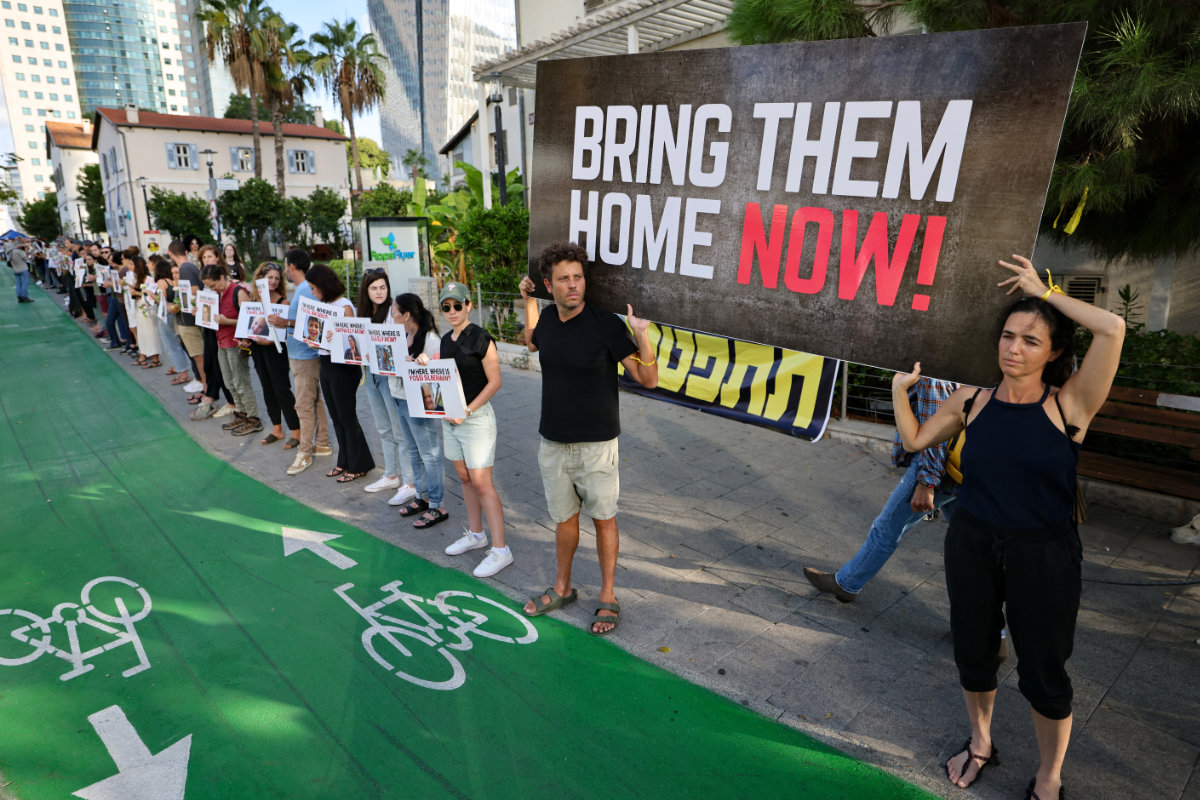
Israelis protest outside the Ministry of Defense in Tel Aviv on October 19, 2023, to demand the release of Israelis held hostage by Hamas militants in the Gaza Strip. (Ahmad Gharabli/AFP)
The previous week Hamas had announced that 50 hostages had already died under Israeli bombardment in Gaza. Now Friday night’s incursions into Gaza by Israeli forces had only ratcheted up the anxiety of relatives, stoking fears that Israel’s much-advertised bombing of 150 underground targets had been carried out with little or no concern for the hostages possibly being held in Hamas tunnels.
“Why this offensive? There is no rush. Hamas wasn’t going anywhere,” one man at the protest told the media as he stood holding a picture of his missing 19-year-old nephew, and a poster that read: “Don’t abandon us twice.”
The mood among the protesters was that the government had already failed the hostages once for having allowed the unprecedented attack of Oct. 7 to take place virtually unchallenged. Now, many believe, morally, the government has only one option — to release all Palestinians held in Israeli prisons in exchange for the hostages.
Opinion
This section contains relevant reference points, placed in (Opinion field)
The cry, “All the prisoners for all the hostages,” that is echoing ominously in Israel’s corridors of power will no doubt be music to the ears of the Hamas leadership.
For now, Hamas appears to be in complete control of the increasingly tense standoff between the Israeli government, its own people, and the under-pressure governments of many of its global allies, and only small adjustments to the model are required by Hamas to maintain the pressure on Netanyahu and his cabinet.
On Oct. 18 a Hamas spokesman announced the group was willing to release women and children.
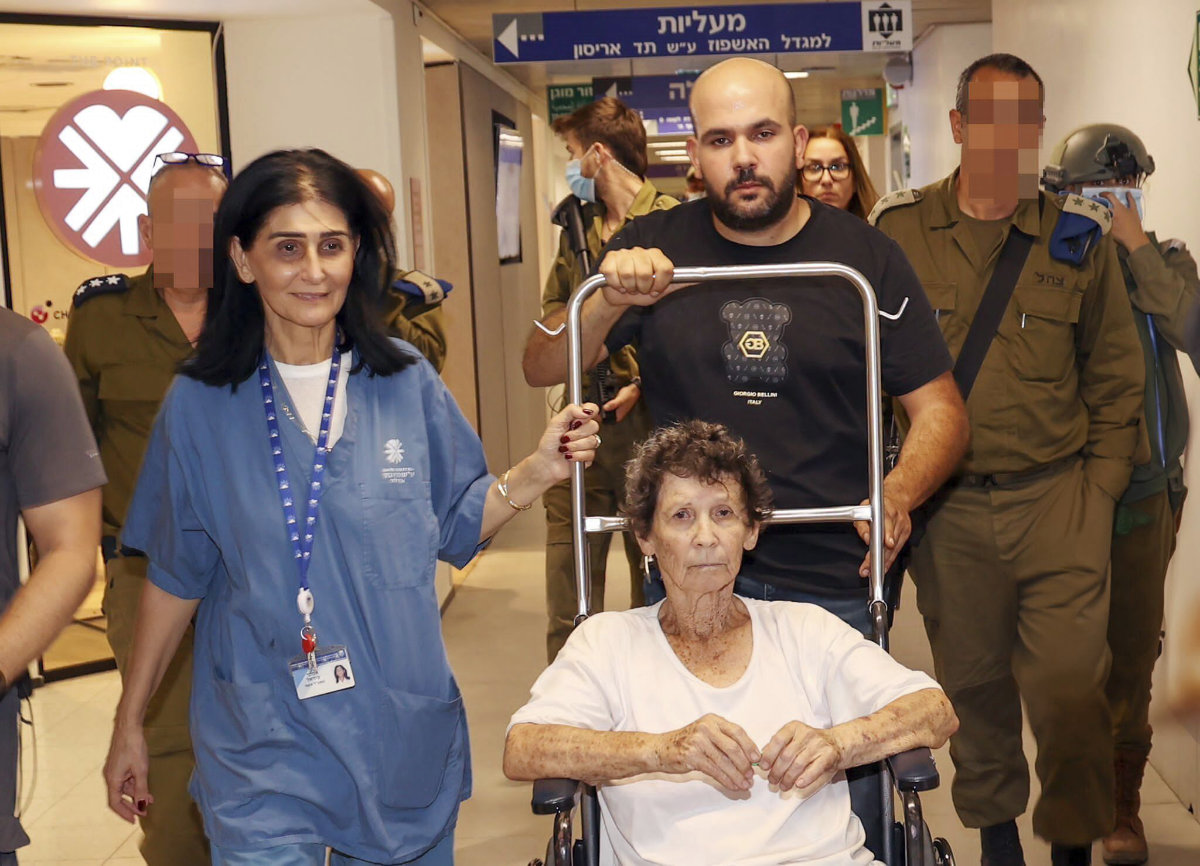
This photo provided by Ichilov hospital shows Yocheved Lifshitz, one of the two women released from Hamas captivity late Monday, Oct. 23, 2023, being wheeled in a wheelchair down the hall at the hospital in Tel Aviv, Israel. (Jenny Yerushalmy/Ichilov hospital via AP)
Two days later, two American hostages, Judith Raanan and her daughter, Natalie, were suddenly released, with US President Joe Biden publicly thanking “the government of Qatar and the government of Israel for their partnership in this work.”
Three days after that, two more elderly Israeli hostages were released. One, 85-year-old grandmother Yocheved Lifshitz, was a peace activist who, according to her grandson, had worked for years helping Palestinians in Gaza to receive medical treatment.
In footage of the women’s release, filmed and released by the media-savvy Hamas, Lifshitz was seen shaking hands with one of her armed captors and wishing him “Shalom” — peace.
On Monday Hamas released a video featuring three kidnapped Israeli women, one of whom accused Netanyahu of having failed to protect Israel on Oct. 7, and then condemned Israel’s military incursions into Gaza.
“We are innocent citizens,” she told her prime minister. “You want to kill us all. You want to kill us all using the IDF (Israel Defense Forces).”
Each such episode bolsters hope for those who remain in captivity, appears to show Hamas in a humanitarian light, and makes any large-scale military incursion into Gaza by Israeli forces appear reckless.
What does Hamas want? Last week a senior official was quoted on NBC News saying that it would be willing to release all civilian hostages “in one hour” if Israel halted all attacks on the Gaza Strip and released all Palestinians detained by Israel.
This is, of course, exactly what many of Israel’s own citizens are now calling for.
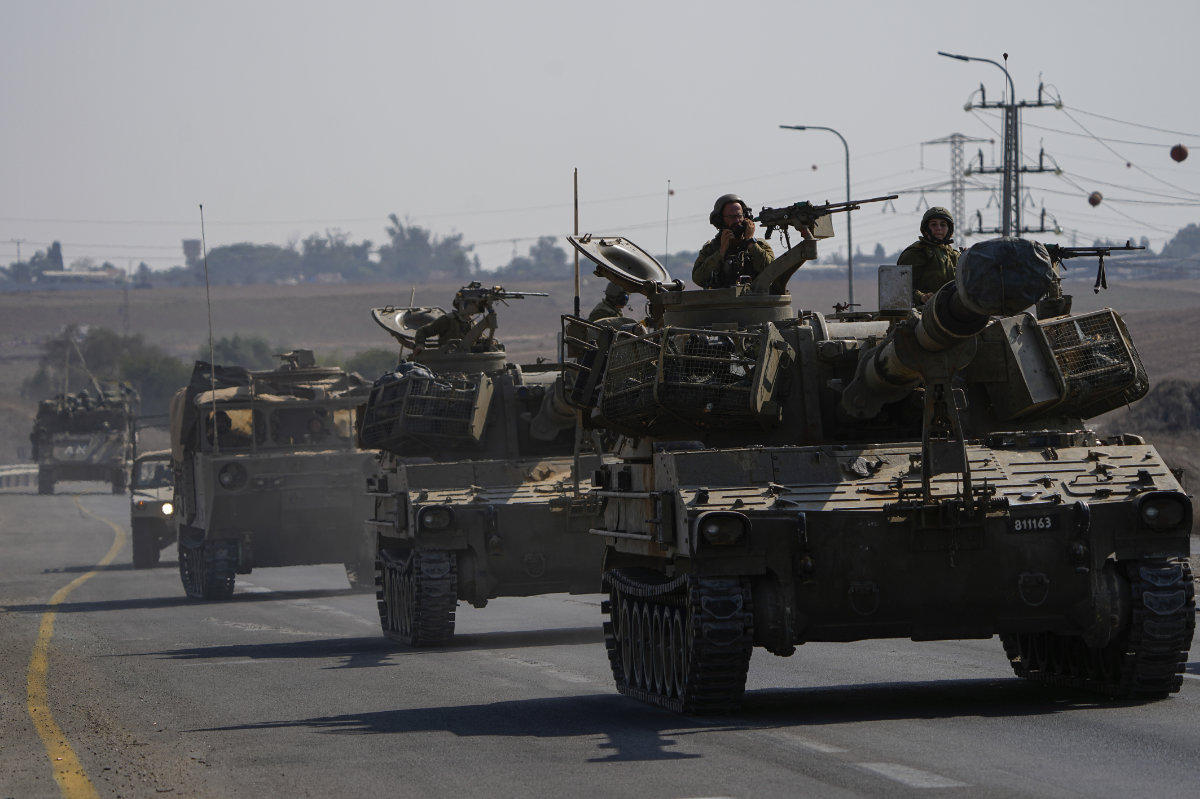
Israeli armored personnel carriers and tanks move towards the Gaza Strip border in southern Israel on Nov.1, 2023. (AP)
But Denselow says the situation in Gaza — and the fate of the hostages held there — remains on a knife edge.
“Reports suggest that the release of a handful of hostages may have played a role in delaying a ground offensive,” he said.
“Yet history shows that while in more stable conflicts hostage negotiation and return can occur, in more fast-moving and intensive conflicts hostages are often tragically unable to escape the wider maelstrom of violence.
“If, by some diplomatic miracle, hostages are safely released, there is still the question of what happens next, and whether violence could indeed escalate.”



















